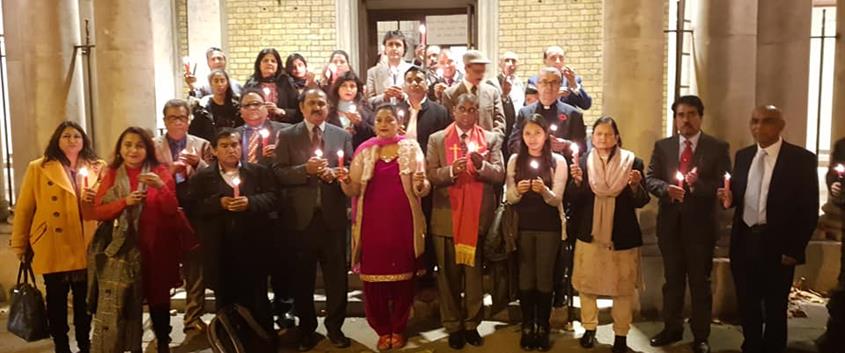The significant decline in Asian Christians from the Bangladeshi and Pakistani diasporas in the UK, exceeding a third from 2011 to 2021, as indicated in the recent Census for England and Wales, has raised concerns within the British Asian Christian Association.
Adding to the distress, the figures for the Arab Christian Diaspora community have more than halved, pointing to a substantial and worrisome shift within these communities over the past decade.
This article first published on 05.12.2023 was revised after receipt of further information from the Office of National Statistics.
A surprising decline in the number of Bangladeshi and Pakistani-origin individuals in England identifying as Christians has puzzled researchers at the British Asian Christian Association. The anticipated doubling of both diaspora Christians in the UK was shattered by alarming statistics from the 2021 Census, revealing a drop from 17,118 to 12,327, since 2011. When questioned about the reasons behind this decline, Wilson Chowdhry, Chairman of United by Faith, pointed out that the Census for England and Wales includes details for international students, a group many Pakistani and Bangladeshi Christian might have belonged to. he believes this may be an important factor when considering the decline.
Between 2011 and 2021, the UK Government imposed stricter regulations on international students, eliminating appeal rights and mandating the return of students to their home nations for course or module changes. Additionally, several educational institutions, which had facilitated access to courses, were blacklisted for fraudulent activities. Students, unaware of this, lost their finances for paid courses, and some, unable to afford replacements within the limited one-month period given for joining a new course, unintentionally became illegal migrants. The legal changes demanding 50% upfront fees for the entire course, especially in fields like medical school with lengthy durations, proved financially burdensome for many Bangladeshi and Pakistani Christians.
Christians in both Pakistan and Bangladesh often hail from underprivileged communities. Even when they manage to overcome the educational barriers imposed on them through discriminatory practices (click here) and curriculum textbooks (click here), they still face the constant threat of bullying that could escalate to fatal incidents in school (click here). Furthermore, the scarcity of local schools, especially those offering a decent quality of education in their areas, adds to the challenges. To compound their struggles, the exorbitant costs associated with foreign education have become increasingly insurmountable for them. Mr. Chowdhry speculated that a considerable number of those former students might still be residing in the UK illegally, driven by desperation to escape the persecution and injustices prevalent in their home nations.
Wilson Chowdhry highlighted another factor—the declining faith in the UK’s churches.
Asian origin and other minority origin Christian communities are not exempt from the religious downturn witnessed in the UK. The younger generation, feeling unaccepted or facing disagreement on personal choices within church environments, has distanced itself. “Political and social stances of churches often are in contrast too what is being taught in schools, this has led many young people to have schism with the church.
Mr Chowdhry, added:
The prevalence of Sunday working schedules has posed a challenge for individuals seeking to attend church, a repercussion stemming from the enactment of the Sunday Trading Act in 1994, supplanting the Shop Act of 1950. This historic gradual diminishing of church attendance was further intensified by the repercussions of the COVID-19 pandemic, as numerous individuals on the periphery of the faith have refrained from returning to church, along with their offspring. “These combined factors have contributed to a decreased likelihood of young people attending church.”
To conclude, he said:
“Furthermore, The Catholic Church’s sexual abuse scandal has disillusioned former Catholics. Moreover, young people are influenced by the power of the media and have become more materialistic. Some get caught up in the freedoms of the West, and have abandoned their faith due to boredom with perceived religious restrictions – this spiritual decline is observed across various faiths.”
Mr. Chowdhry astutely points out that many contemporary churches are grappling with an aging demographic, facing challenges in connecting with younger generations—a missed opportunity during the church’s more prosperous times. He emphasizes the urgent need for the church to awaken and initiate robust grassroots evangelism programs. To rejuvenate the church’s presence in the UK, he advocates for a return to addressing the fundamental needs of our communities. This involves implementing outreach initiatives and evangelism efforts that communicate the Gospel in the primary languages of new migrants, presenting the Bible in its intended context and elucidating its relevance in our contemporary world. Crucially, Mr. Chowdhry urges a shift away from antiquated religious practices, directing focus towards the transformative message inherent in the Gospel of Christ.
Mr Chowdhry further surmised that the Indian Christian diaspora has nearly doubled during the same period. This could be attributed to the greater establishment of the Indian diaspora Church in the UK compared to its Pakistani-origin counterpart. the size of the community has meant fluctuations are less noticeable. Moreover, Christians from India who migrate to the UK are often from more affluent backgrounds.
Additionally, mixed marriages are likely to contribute to the diversification, thereby reducing the number of individuals in England and Wales who identify specifically as Bangladeshi or Pakistani-origin Christians. In Christian communities, there’s often a greater likelihood of acceptance towards interracial marriages. This is attributed to the belief that faith, rather than cultural background, is considered the predominant and overriding principle when choosing a marriage partner.
The British Asian Christian Association highlights a seismic decrease, nearly 50%, in the number of Arab Christians in the UK, a trend that organizations within the diaspora are better equipped to comprehend. Wilson Chowdhry, while acknowledging that factors affecting this decline are better understood by internal organizations, speculates on potential influences. He estimates that various factors, including the challenges faced by converts who are shunned by their families and communities, may be impacting the Arab Christian community. Chowdhry suggests that some individuals in this statistic might be new converts who, lacking adequate support, could return to their original faith, failing to understand the true glory of the Gospel. Mr Chowdhry further raises the possibility of false converts among the statistics—individuals seeking asylum visas rather than genuinely embracing the Christian faith. This reported factor suggests that some might have participated in the census as part of a strategic ploy to secure asylum, adding a layer of complexity to the demographic changes observed in the Arab Christian community in the UK. Mr Chowdhry notes that some individuals within the Arab Christian community might face persecution within their communities, leading them to reluctantly revert to their previous faith. The challenges and pressures from their surroundings could compel them to abandon their newfound beliefs for the sake of social acceptance or safety. Referring to the Al Swealmeen incident of 2021 (click here), Mr Chowdhry expresses the need for clarification from an Arab Christian group to better understand and address the situation.
Juliet Chowdhry, as a Trustee for the British Asian Christian Association, expressed deep concern over the dwindling numbers of Pakistani origin Christians in the UK. She emphasizes the crucial need for leading Asian Christian Churches to proactively engage with the next generation, ensuring the continued accessibility of the Gospel within the diaspora.
Mrs Chowdhry underscores that the success of the Asian Church hinges on thoughtfully crafted outreach initiatives and fostering spiritual fellowship. She advocates for collective participation in instigating a positive change, fostering a genuine desire for the preservation of God’s word among the younger generation.
Importantly, she clarified:
“This endeavor isn’t about diluting the Gospel but rather reiterating the intrinsic value of God’s word and connecting it to the contemporary world. The goal is to present the principles of faith in a way that resonates with young minds, facilitating comprehension without confusion.”
Asian Diaspora Christians in England and Wales 2021:
| Asian, Asian British or Asian Welsh: Bangladeshi | Christian | 2220 |
| Asian, Asian British or Asian Welsh: Indian | Christian | 225935 |
| Asian, Asian British or Asian Welsh: Pakistani | Christian | 12327 |
| Other ethnic group: Arab | Christian | 13671 |
| Mixed or Multiple ethnic groups: White and Asian | 2 | Christian | 133944 |
Asian Christian Diaspora in England and Wales taken from 2011 Census:
| Ethnic Group | Christian |
| Asian/Asian British: Bangladeshi | 6,558 |
| Asian/Asian British: Indian | 135,988 |
| Asian/Asian British: Pakistani | 17,118 |
| Other ethnic group: Arab | 21,988 |
| Mixed/multiple ethnic group: White and Asian | 120,158 |
A dataset was created for Ethnic group by religion by the Office for National Statistics at the request of British Asian Christian Association. You can access it (here).


